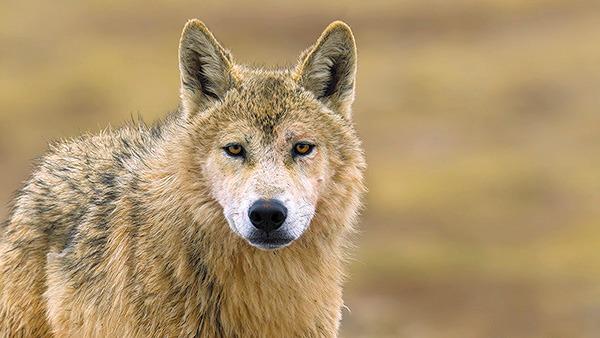 An ever-alert wolf and a Tibetan antelope featured in the documentary Biodiversity on Earth — Zhuonai Lake, produced by the second comprehensive scientific expedition team to the Qinghai-Tibet Plateau. (PHOTO PROVIDED TO CHINA DAILY)
An ever-alert wolf and a Tibetan antelope featured in the documentary Biodiversity on Earth — Zhuonai Lake, produced by the second comprehensive scientific expedition team to the Qinghai-Tibet Plateau. (PHOTO PROVIDED TO CHINA DAILY)
Every summer, thousands of pregnant antelopes return hundreds of kilometers from their scattered habitats to Zhuonai Lake, in Northwest China's Qinghai province, to give birth. The lake, located in the remote Hoh Xil region, has been dubbed a "delivery room" for the once endangered species, long studied by animal behavior researchers as an example of mass animal exodus to rival the Serengeti in Africa.
A group of scientists from Yunnan University and the Kunming Institute of Zoology, affiliated to the Chinese Academy of Sciences, spent a total of 18 months starting in early 2020 shooting a thousand hours of footage of the spectacle and other animal activities.
After six months spent in post-production, the materials were edited down into Biodiversity on Earth - Zhuonai Lake, a 57-minute documentary which has earned a score of 9.7 out of 10 in aggregate review on Bilibili, one of the country's most popular video-sharing platforms.
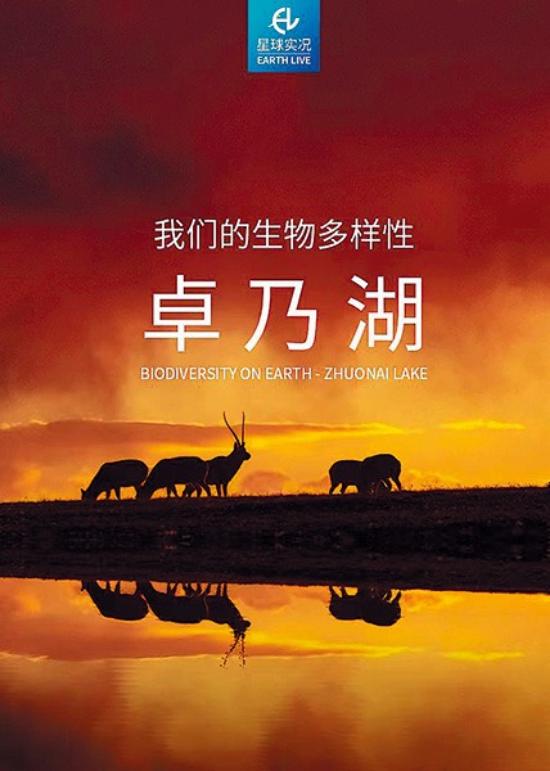 A poster for the documentary Biodiversity on Earth — Zhuonai Lake. (PHOTO PROVIDED TO CHINA DAILY)
A poster for the documentary Biodiversity on Earth — Zhuonai Lake. (PHOTO PROVIDED TO CHINA DAILY)
The documentary, produced by the team of China's second comprehensive scientific expedition to the Qinghai-Tibet Plateau, also captured a variety of other wildlife, from wandering yaks to fluffy plateau pikas and galloping Tibetan wild asses.
READ MORE: Rescued Tibetan antelope calves at Qinghai protection station
This is the directorial debut of Luo Jie, a 36-year-old scientist at the Kunming Institute of Zoology. A native of Kunming, the capital of Southwest China's Yunnan province, Luo developed a strong interest in nature in his childhood, recounting his obsession with programs such as Animal World, a series of remarkable longevity, broadcast on China Central Television since 1981.
Around six years ago, Luo started to combine his passion for research and film by shooting beneath the ocean while researching coral reefs and clownfish in Indonesia.
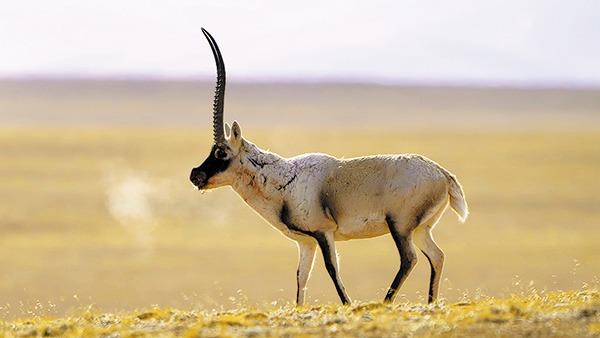 An ever-alert wolf and a Tibetan antelope featured in the documentary Biodiversity on Earth — Zhuonai Lake, produced by the second comprehensive scientific expedition team to the Qinghai-Tibet Plateau. (PHOTO PROVIDED TO CHINA DAILY)
An ever-alert wolf and a Tibetan antelope featured in the documentary Biodiversity on Earth — Zhuonai Lake, produced by the second comprehensive scientific expedition team to the Qinghai-Tibet Plateau. (PHOTO PROVIDED TO CHINA DAILY)
Luo recalls the experience of diving 40 meters down into the depths with a waterproof camera as dreamlike and spiritually healing.
"The water turns darker as you dive deeper. Because most underwater creatures are not afraid of humans, you can see a variety of fish swimming around you," Luo says.
This amateur experience earned Luo a chance to shoot the feature-length documentary, which aims to demonstrate the work of biodiversity conservationists on the plateau. He collaborated on the project with fellow scientist Zhang Zhigang, field work expert Wu Jun and wildlife cinematographer Zhang Chenghao.
ALSO READ: A target with a natural outcome
"We take Zhuonai Lake as our 'protagonist', as it has drawn in generations of Tibetan antelopes inhabiting in multiple areas of Qinghai and the Xinjiang Uygur and Tibet autonomous regions over age-old migration routes. Why they decide to take such high risks and trek such a long distance to deliver their young is still a mystery," explains Zhang Zhigang, a microbiologist at Yunnan University.
 A plateau pika. (PHOTO PROVIDED TO CHINA DAILY)
A plateau pika. (PHOTO PROVIDED TO CHINA DAILY)
He says that, as the route into the no man's land of Zhuonai Lake is dangerous, few people travel there, so the area is a shelter for wildlife, making it valuable for scientific research.
The team had its work cut out for it, with the dual task of filming the documentary and conducting scientific research - for example collecting Tibetan antelopes' droppings to get a clearer picture of the local ecosystem -all in an environment of extreme deprivation.
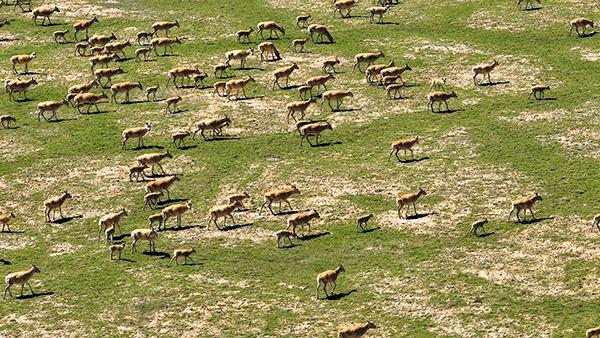 Tibetan antelopes seek new pastures. (PHOTO PROVIDED TO CHINA DAILY)
Tibetan antelopes seek new pastures. (PHOTO PROVIDED TO CHINA DAILY)
Luo, who specializes in oceanic biodiversity, could perhaps be described as a fish out of water in the antelopes' montane habitat.
The altitude of Zhuonai Lake reaches nearly 5,000 meters, presenting a number of challenges. The expedition members had to use pressure cookers to make their meals, and endured frozen temperatures of minus 30 C and below.
"We also had to carry buckets of fresh water as the water stored at the station was kept for local staff," says Luo.
Although encountering wild animals can be exciting, Luo says the crew was cautious not to interrupt the rhythms of life in the area, and to avoid offending its fiercer inhabitants.
ALSO READ: Animal crossings
"Most people may think wolves are dangerous, but they are actually scared of humans. A small pack of wolves normally run away when they see humans and their vehicles approach. Wild bears, especially females with cubs in the breeding season, are more dangerous. They may attack if they feel threatened," Luo explains.
While filming, researching and navigating the intricacies of life on the plateau, Luo managed to maintain his daily routine of calling colleagues at the Kunming institute, asking about the situation in his laboratory, which raises all nine species of clownfish and more than 170 species of coral.
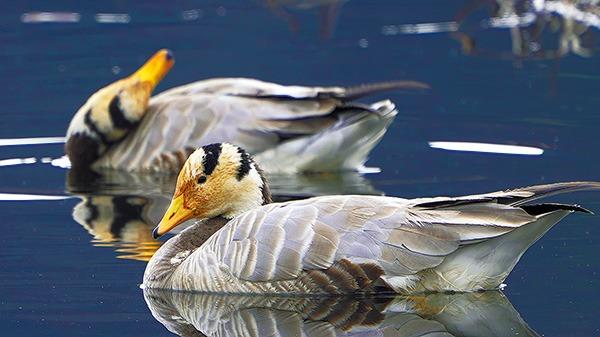 Bar-headed geese relax in the wetland near Zhuonai Lake, in the remote Hoh Xil region of Qinghai province. (PHOTO PROVIDED TO CHINA DAILY)
Bar-headed geese relax in the wetland near Zhuonai Lake, in the remote Hoh Xil region of Qinghai province. (PHOTO PROVIDED TO CHINA DAILY)
With Biodiversity on Earth - Zhuonai Lake having garnered over 132,000 views on Bilibili, Zhang Zhigang says he feels all the effort has paid off.
He hopes the documentary, shot by conservationists uninterested in commercial gain, will attract young viewers to develop an interest in wildlife protection in China.
According to the National Forestry and Grassland Administration, the population of Tibetan antelopes dropped in early 1990s to around 70,000 due to intensive poaching. The Chinese government has since instituted major protection efforts, and the population has currently increased to 300,000. In 2021, it was removed from the country's endangered species list.
Zhang says the picture of massive herds of antelopes streaming back to Zhuonai Lake to give birth will forever be etched in his mind.
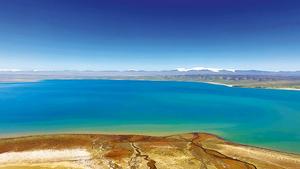 A bird's-eye view of the Zhuonai Lake. (PHOTO PROVIDED TO CHINA DAILY)
A bird's-eye view of the Zhuonai Lake. (PHOTO PROVIDED TO CHINA DAILY)
And Luo says: "In the past, I was amazed to see on TV the great migrations in Africa. But when you see this antelope migration with your own eyes, you will feel proud that China is also home to such natural phenomena, and you will also feel awe for the majesty of life."
Contact the writers at xufan@chinadaily.com.cn


